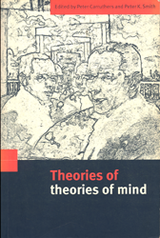
Theories of Theories of Mind
Theories of Theories of Mind. Edited by Peter Carruthers and Peter K Smith, 406pp. (Cambridge University Press, 1996).
Theories of Theories of Mind brings together contributions by a distinguished international team of philosophers, psychologists, and primatologists, who between them address such questions as: what is it to understand the thoughts, feelings and intentions of other people? how does such an understanding develop in the normal child? why, unusually, does it fail to develop? and is any such mentalistic understanding shared by members of other species? The volume’s four parts together offer a state of the art survey of the major topics in the theory-theory/simulationism debate within philosophy of mind, developmental psychology, the aetiology of autism and primatology. The editors have provided an introduction which maps the content of the book and surveys the recent history of the field, and a consolidated bibliography which will provide a useful reference resource for all those interested in this area. The volume will be of great interest to researchers and students in all areas interested in the "theory of mind" debate. (from the back cover)
Theories of Theories of Mind. Edited by Peter Carruthers and Peter K Smith, 406pp. (Cambridge University Press, 1996).
Theories of Theories of Mind brings together contributions by a distinguished international team of philosophers, psychologists, and primatologists, who between them address such questions as: what is it to understand the thoughts, feelings and intentions of other people? how does such an understanding develop in the normal child? why, unusually, does it fail to develop? and is any such mentalistic understanding shared by members of other species? The volume’s four parts together offer a state of the art survey of the major topics in the theory-theory/simulationism debate within philosophy of mind, developmental psychology, the aetiology of autism and primatology. The editors have provided an introduction which maps the content of the book and surveys the recent history of the field, and a consolidated bibliography which will provide a useful reference resource for all those interested in this area. The volume will be of great interest to researchers and students in all areas interested in the "theory of mind" debate. (from the back cover)
Table of Contents
- Peter Carruthers and Peter K Smith. Introduction.
- Robert Gordon. 'Radical' simulationism.
- Peter Carruthers. Simulation and self-knowledge: a defence of theory-theory.
- Shaun Nichols, Stephen Stich, Alan Leslie and David Klein. Varieties of off-line simulation.
- Jane Heal. Simlulation, theory and content.
- Josef Perner. Simulation as explicitation of predication-implicit knowledge about the mind: arguments for a simulation-theory mix.
- George Botterill. Folk psychology and theoretical status.
- Tony Stone and Martin Davies. The mental simulation debate: a progress report.
- Gabriel Segal. The modularity of theory of mind.
- Simon Baron-Cohen and John Swettenham. The relationship between SAM and ToMM: two hypotheses.
- Alison Gopnik. Theories and modules: creation myths, developmental realities, and Neurathís boat.
- Janet Astington. What is theoretical about the childís theory of mind?: a Vygotskian view of its development.
- Paul Harris. Desires, beliefs and language.
- Jill Boucher. What could possibly explain autism?
- Gregory Currie. Simulation-theory, theory-theory, and the evidence from autism.
- Peter Carruthers. Autism as mind-blindness: an elaboration and partial defence.
- Andrew Whiten. When does smart behaviour-reading become mind-reading?
- Daniel Povinelli. Chimpanzee theory of mind?: the long road to strong inference.
- Juan-Carlos Gomez. Non-human primate theories of (non-human primate) minds: some issues concerning the origins of mind-reading.
- Peter K Smith. Language and the evolution of mind-reading.